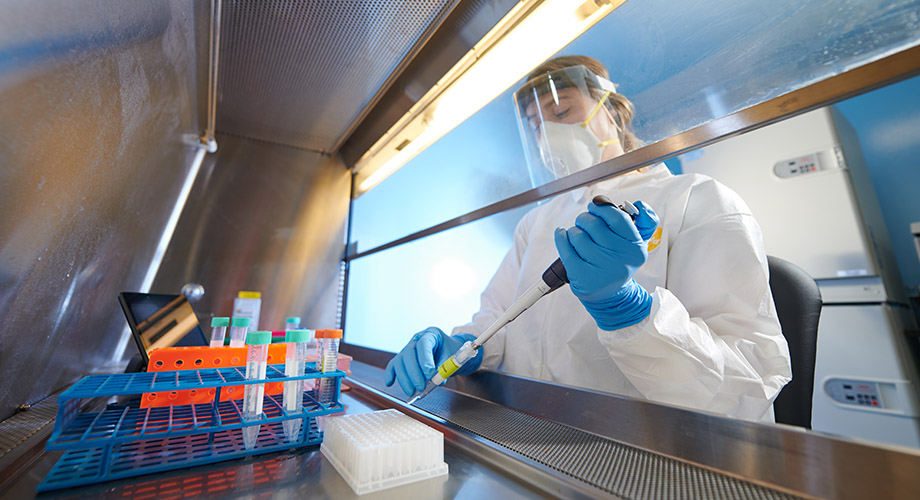
Catelyn Anderson, a research assistant in the laboratory of Professor Kristian Andersen, PhD, processing samples in preparation for sequencing.
Mardi Gras 2020: A Fateful Super-Spreader Event
Study shows how annual event accelerated Louisiana’s first COVID-19 wave.
July 29, 2021
LA JOLLA, CA—New Orleans’ Mardi Gras festival of February 2020 appears to have driven one of the worst early outbreaks of COVID-19 in the United States, according to a study led by scientists at Scripps Research.
In the study, which appears in Cell, the scientists sequenced and analyzed the COVID-19-causing coronavirus, SARS-CoV-2, recovered from patients, as well as data on population movements, COVID-19 deaths, and other relevant sources of information for the first wave of the pandemic in Louisiana. They concluded that SARS-CoV-2 most likely came to Louisiana in early February 2020 from a single infected person in Texas and spread to hundreds of people during the Mardi Gras festival later that month—seeding the large outbreak of COVID-19 in Louisiana and neighboring states that became apparent in March.
“Our findings show how a single, large-scale social event can play a major role in kick-starting a viral epidemic when no restrictions are in place,” says study co-first author Mark Zeller, PhD, a postdoctoral researcher in the laboratory of Kristian Andersen, PhD, professor in the Department of Immunology and Microbiology at Scripps Research in California.
Andersen, Zeller and their colleagues undertook the study, a collaboration involving about two dozen scientific and public health institutions in Louisiana and around the world, to gain a better understanding of SARS-CoV-2’s early and mostly undetected spread in the US.
New Orleans’ annual Mardi Gras festival was held in 2020 from February 14–25. Although this was more than a month after the COVID-19 pandemic had begun, it was still weeks before the disease was known to have been transmitted within the U.S. In agreement with federal guidelines at the time, local authorities therefore imposed no restrictions on the festival, and the million-plus revelers took few precautions. Twelve days after the festival ended, however, local hospitals began to detect COVID-19 cases, and health officials belatedly faced the reality of a fast-growing outbreak centered on New Orleans.
In the new study, the researchers showed that by contrast with early COVID-19 outbreaks in New York and Washington state, which were initiated by incoming travelers from Europe and Asia, the Louisiana outbreak appears to have been seeded via domestic travel—likely including a single, dominant transmission event connected to Texas.
“One of the striking things about the SARS-CoV-2 isolates we sampled from Louisiana’s first wave was that they had very low genetic diversity, suggesting that almost all had come from the same single source,” says Karthik Gangavarapu, PhD, a co-first author and postdoctoral researcher in Andersen’s lab. “It was comparable to what other investigators have observed in COVID-19 outbreaks on cruise ships.”
Although the analysis pointed to the likelihood that SARS-CoV-2 was introduced into Louisiana and was already spreading slowly just prior to the start of the Mardi Gras festival, it also indicated that the observed number of infections after the festival was much higher than what would have been expected under ordinary conditions.
Yet during this interval the virus didn’t show any genetic change that would increase its inherent transmissibility, says co-first author Catelyn Anderson, a research assistant in the Andersen lab. “The implication is that the festival was a genuine super-spreader event that created near-ideal conditions for viral transmission,” says Anderson.
The researchers estimate that Mardi Gras probably amplified the number of infections in Louisiana from a handful to well over 500, and thus helped to jump-start the early COVID-19 pandemic in the US southern states.
“One take-home from all this is that large gatherings of people, in the absence of near-complete vaccination or other strict control efforts, will likely continue to amplify the pandemic,” Zeller says.
“Emergence of an early SARS-CoV-2 epidemic in the United States” was co-authored by 52 scientists. Support for the research was provided by the National Institutes of Health (U19AI135995, 3U19AI135995-03S2, UL1TR002550, U01AI151812, U01AI124302, R01AI153044 , R01HG006139), and by the European Union’s Horizon 2020 program.
For more information, contact press@scripps.edu

